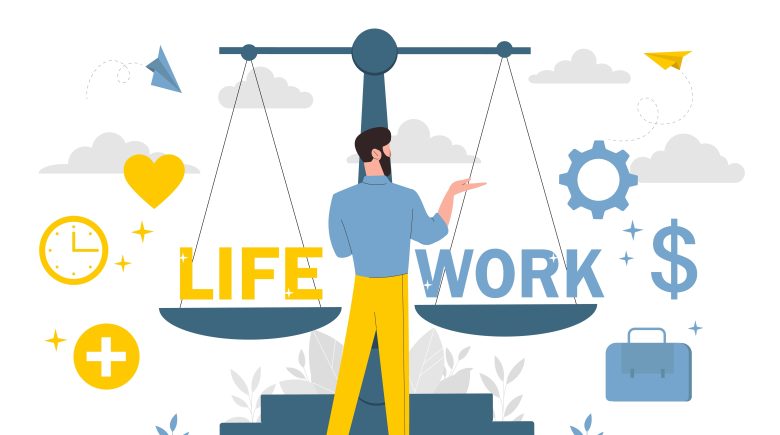Balancing work and life to achieve balance is critical to ensuring people’s general health and productivity. This balance can sometimes be challenging to achieve, given the fast-paced demands of everyday work. But, if you prepare, it’s possible to balance your life effectively. Here are some effective strategies for achieving work-life harmony:
1. Prioritize and Set Boundaries
Task management and boundaries are critical aspects of work/life integration. The first thing to do is to prioritize the most urgent tasks and tackle them right away. Establish boundaries by not texting work emails or catching work calls during free time. It is essential to let coworkers and even relatives know when they should or should not contact you. The ability to set these boundaries successfully will help you to get more work done and ensure that you are more involved in your personal life.
2. Create a Schedule and Stick to It
An effective schedule ensures that the individual is organized in terms of both professional and personal life. Have a daily schedule that defines time for work, family and personal leisure. It is also imperative to schedule time for work breaks to avoid fatigue and fatigue. Routines can help to maintain an environment of stability and predictability that is necessary for successfully managing work demands and family burdens. Through a schedule, you can make sure that every aspect of your life is taken care of at the right time to lead a balanced life.
3. Learn to Say No
Learning how to say no is crucial for work-life balance. Accept that you can’t do everything and focus on all the things that really matter. Avoid taking the non-exonerating ones if you know that they will create more strain. This removes the need for you to focus on unnecessary factors hence eliminating the danger of exhaustion and enhancing general effectiveness. These limits help to preserve the time and energy required to fulfill professional and personal tasks. Embrace the power of saying no to create a more balanced and fulfilling life.
4. Leverage Technology
Technology is an effective tool to achieve work-life balance. You can use any time management software or app to manage tasks. Some of the tools used are Trello, Asana, and Slack to schedule work in teams. Other vital apps include calendars to help in scheduling and reminders of appointments and deadlines. These technologies will help you to manage your time and meet deadlines in your work as well as in your personal life. No doubt embracing these tools improves productivity as well as helps to establish a more organized and balanced life.
5. Take Care of Your Health
Health is also essential for maintaining the work-life balance. It would help if you always remained active by exercising, consuming healthy foods, and sleeping well. Learn stress management techniques like spending time relaxing through exercising such as yoga or meditation. These habits enable you to not only become physically strong but also emotionally and mentally prepared to face the challenges of work and life. Self-care ensures you can work more effectively, produce higher-quality work, and live a more fulfilling life.
6. Make Time for Hobbies and Interests
It is also essential to consider leisure activities and interests. Engaging in non-work activities like reading, painting, or working on a sport is also a good form of rest for the mind. Spending time on these activities reduces stress and increases the sense of well-being. Learning or doing anything that is one’s favorite activity is also enjoyable and brings a lot of relaxation after one is tired from work. Identifying and supporting interests are vital for well-being.
7. Seek Support When Needed
It is also essential to keep in mind that help from friends and family or professionals is available and should be sought when necessary. Consulting friends for advice can also help a person develop a new understanding of the situation and even alleviate stress. People who really care about an individual can provide emotional support, and experts such as counselors and coaches may help formulate strategies to balance work and life. The decision to seek help is not a sign of weakness but rather demonstrates the person’s care about his or her mental well-being. You are not alone and help is always available to make you understand yourself better and cope with situations in a healthy and balanced way.
8. Work Smarter, Not Harder
Focus on productivity instead of working for long hours. Organize your tasks according to their priority and level of significance; delegate whenever possible. If the task at hand seems too large, break it down into smaller tasks. Manage your time wisely in order to achieve more in less time and have extra time to spend on your activities. This approach leads to greater efficiency and more time for work and other activities.
9. Cultivate a Positive Work Environment
It is also essential to create a positive work environment in order to achieve a balance between work and life. Help to create a comfortable work environment and seek changes, if necessary, in case of difficulties with colleagues or superiors in relation to working hours. Work life balance is an effective avenue that helps in improving job satisfaction and health. Employees only integrate their professional and personal lives when they feel valued and understood.
10. Reflect and Adjust
It is critical to reflect on appropriate work-life balance and continue to make adjustments to achieve a balance that is sustainable in the long term. Determine what works and what does not, and be willing to adopt adjustments to prevent falling. Life is always unpredictable and this means that your work-life balance strategy has to be easily adjustable. This type of evaluation allows keeping yourself on track regarding your priorities and the balance between professional and personal life.
Adopting these approaches will help you to achieve a healthier work-life balance and live a more satisfying and successful life. Keep in mind that work-life balance is never an outcome; it is a constant process of balancing and readjusting. Listen to your body and mind, take care of yourself, and value your time.
Balancing work and life to achieve balance is critical to ensuring people’s general health and productivity. This balance can sometimes be challenging to achieve, given the fast-paced demands of everyday work. But, if you prepare, it’s possible to balance your life effectively. Here are some effective strategies for achieving work-life harmony:
1. Prioritize and Set Boundaries
Task management and boundaries are critical aspects of work/life integration. The first thing to do is to prioritize the most urgent tasks and tackle them right away. Establish boundaries by not texting work emails or catching work calls during free time. It is essential to let coworkers and even relatives know when they should or should not contact you. The ability to set these boundaries successfully will help you to get more work done and ensure that you are more involved in your personal life.
2. Create a Schedule and Stick to It
An effective schedule ensures that the individual is organized in terms of both professional and personal life. Have a daily schedule that defines time for work, family and personal leisure. It is also imperative to schedule time for work breaks to avoid fatigue and fatigue. Routines can help to maintain an environment of stability and predictability that is necessary for successfully managing work demands and family burdens. Through a schedule, you can make sure that every aspect of your life is taken care of at the right time to lead a balanced life.
3. Learn to Say No
Learning how to say no is crucial for work-life balance. Accept that you can’t do everything and focus on all the things that really matter. Avoid taking the non-exonerating ones if you know that they will create more strain. This removes the need for you to focus on unnecessary factors hence eliminating the danger of exhaustion and enhancing general effectiveness. These limits help to preserve the time and energy required to fulfill professional and personal tasks. Embrace the power of saying no to create a more balanced and fulfilling life.
4. Leverage Technology
Technology is an effective tool to achieve work-life balance. You can use any time management software or app to manage tasks. Some of the tools used are Trello, Asana, and Slack to schedule work in teams. Other vital apps include calendars to help in scheduling and reminders of appointments and deadlines. These technologies will help you to manage your time and meet deadlines in your work as well as in your personal life. No doubt embracing these tools improves productivity as well as helps to establish a more organized and balanced life.
5. Take Care of Your Health
Health is also essential for maintaining the work-life balance. It would help if you always remained active by exercising, consuming healthy foods, and sleeping well. Learn stress management techniques like spending time relaxing through exercising such as yoga or meditation. These habits enable you to not only become physically strong but also emotionally and mentally prepared to face the challenges of work and life. Self-care ensures you can work more effectively, produce higher-quality work, and live a more fulfilling life.
6. Make Time for Hobbies and Interests
It is also essential to consider leisure activities and interests. Engaging in non-work activities like reading, painting, or working on a sport is also a good form of rest for the mind. Spending time on these activities reduces stress and increases the sense of well-being. Learning or doing anything that is one’s favorite activity is also enjoyable and brings a lot of relaxation after one is tired from work. Identifying and supporting interests are vital for well-being.
7. Seek Support When Needed
It is also essential to keep in mind that help from friends and family or professionals is available and should be sought when necessary. Consulting friends for advice can also help a person develop a new understanding of the situation and even alleviate stress. People who really care about an individual can provide emotional support, and experts such as counselors and coaches may help formulate strategies to balance work and life. The decision to seek help is not a sign of weakness but rather demonstrates the person’s care about his or her mental well-being. You are not alone and help is always available to make you understand yourself better and cope with situations in a healthy and balanced way.
8. Work Smarter, Not Harder
Focus on productivity instead of working for long hours. Organize your tasks according to their priority and level of significance; delegate whenever possible. If the task at hand seems too large, break it down into smaller tasks. Manage your time wisely in order to achieve more in less time and have extra time to spend on your activities. This approach leads to greater efficiency and more time for work and other activities.
9. Cultivate a Positive Work Environment
It is also essential to create a positive work environment in order to achieve a balance between work and life. Help to create a comfortable work environment and seek changes, if necessary, in case of difficulties with colleagues or superiors in relation to working hours. Work life balance is an effective avenue that helps in improving job satisfaction and health. Employees only integrate their professional and personal lives when they feel valued and understood.
10. Reflect and Adjust
It is critical to reflect on appropriate work-life balance and continue to make adjustments to achieve a balance that is sustainable in the long term. Determine what works and what does not, and be willing to adopt adjustments to prevent falling. Life is always unpredictable and this means that your work-life balance strategy has to be easily adjustable. This type of evaluation allows keeping yourself on track regarding your priorities and the balance between professional and personal life.
Adopting these approaches will help you to achieve a healthier work-life balance and live a more satisfying and successful life. Keep in mind that work-life balance is never an outcome; it is a constant process of balancing and readjusting. Listen to your body and mind, take care of yourself, and value your time.






